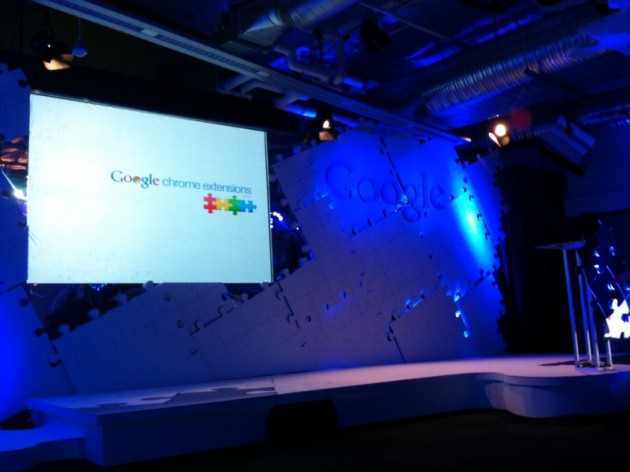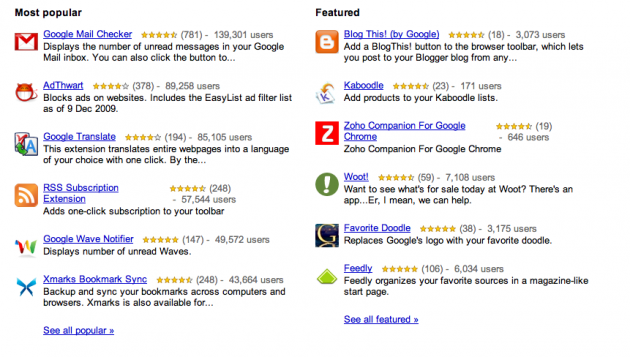 Mozilla and Google share a common enemy: Microsoft. They also share a lot of money (Google pours millions of dollars in Mozilla and is responsible for most of its revenue). And it would seem that ideologically they share the same belief that the web is the platform of the future. All of this has blunted a lot of the talk that Google’s Chrome browser was competing with Mozilla’s Firefox browser. But with the launch of extensions for Chrome it’s pretty hard to deny it at this point.
Mozilla and Google share a common enemy: Microsoft. They also share a lot of money (Google pours millions of dollars in Mozilla and is responsible for most of its revenue). And it would seem that ideologically they share the same belief that the web is the platform of the future. All of this has blunted a lot of the talk that Google’s Chrome browser was competing with Mozilla’s Firefox browser. But with the launch of extensions for Chrome it’s pretty hard to deny it at this point.
Perhaps Firefox’s biggest selling point is that it has an expansive library of extensions that work with the browser. Even as Firefox gets beaten in performance tests, and people complain about its bloat, the extensions are always the thing that users go back to as the reason that they can’t switch. But now Chrome has those too. Sure, not as many yet, but they’re coming — fast.
And fast is maybe the main key to this. As Google demonstrated tonight at a Chrome Extension launch event at its headquarters in Mountain View, it is very, very easy to make extensions for Chrome. “Extensions are just web pages,” Chrome engineer Erik Kay noted at one point before he and fellow engineer, Aaron Boodman, made an extension live on stage in all of five minutes.
Later on in the event, Google had third-party extension developers come up and describe just how easy it was to create them for Chrome. Obviously, those guys are all going to say the right things on stage, but I had conversations with a number of different extension developers after the event — every single one of them gushed about the ease of making a Chrome extension.
Not only did they gush, but many made the obvious comparison to making an extension for Firefox. Again, every single one of them noted just how much easier it was with Chrome. This is largely thanks to the fact that Chrome extensions really are built simply using web languages as Kay noted. Creating a Firefox extension is a much more involved process.
But perhaps even more problematic for Mozilla is the extension submission process. With Chrome, for the majority of extensions, once you submit them, they are instantaneously live in the Extensions Gallery. The exceptions are if they use native code or access the file system, Google reserves the right to review them (which basically amounts to the developer signing an agreement that they have no malicious intent, and sending it to Google).
The process for submitting a Firefox extension can take longer — in some cases significantly longer, I was told by multiple developers. The few I asked wouldn’t go so far as to compare it to Apple’s App Store review process, but they said it’s not entirely dissimilar either. Google, on the other hand, is much more open. And that’s gaining them a lot of fans in the extension developer community.

One of them is James Joaquin, the CEO of Xmarks, one of the most popular extensions for Firefox (it was formerly known as Foxmarks), that just launched a Chrome version. Joaquin could not believe just how quickly you can get an extension out there with Chrome compared to what it’s like for the other browsers.
Michael Galpert, one of the founders of Aviary, makers of another new Chrome extension was also amazed by the extension updating process. Much like Chrome itself, extensions auto-update, removing a problem that developers often find annoying: That most users will not take the time to update, even when prompted. Some users may be uneasy that developers can push updates at their extensions as they please, but Galpert thinks the trade-off is definitely worth it.
It’s also worth noting that thanks to this auto-updating feature, Google is able to remotely kill any extension that is found to be doing bad things to people’s systems. Yes, Google has a kill switch, much like Apple does for iPhone apps.
Also significant is that for the installation and updating of Chrome extensions, no browser restart is necessary. Again, with Firefox, that is the case. “It just works,” Kay noted in a very Apple-like way.
But in terms of the extensions themselves, nothing is more important than performance. With Firefox, unfortunately, that’s been an issue. The more extensions you have, the worse the overall browsing experience seems to get. Google is promising that Chrome extensions will not suffer from the same fate.
Kay noted that the team installed 50 extensions on one browser to see how it would affect things like startup time and page load time. At first, they did a slow page load times, but Google went to work and made some tweaks to get the load times running in line with regular Chrome load times — again, with 50 extensions running.
Every Chrome extension is also its own process. At one point Kay and Boodman showed off a “badly behaving extension” that was designed to wreak havoc on a system’s CPU resources. While it did that, the other tabs and extensions remained running, unfazed. Using the Task Manager within Chrome, they simply shut down the offending extension and continued browsing as if nothing had ever happened.
Google has also developed a new technology that it calls “Isolated Worlds,” which allows them to keep the scripts a webpage normally uses separate from the scripts an extension may run. This is important from a security perspective.

Basically, the gist I got from tonight was that Google has perfected browser extensions. Again, obviously Google is going to be selling that message, but it’s actually the third-party developers who seem even more excited about it. At one point early on, Google thanked Mozilla and Firefox for making extensions something that people demanded. They then dove into their presentation about how they’ve made them better.
Over the past several months, Internet Explorer has continued to lose market share as Firefox and Chrome gain it. But at some point, with the extension excuse now out of the way, I’m starting to think Chrome will begin eating into Firefox’s share as well.
Yes, right now Chrome is just a single-digit sliver of the market, but it has a few very compelling things in its favor. First, it’s now available on all the major platforms (Windows, OS X, Linux). Second, it offers the best performance (though some tests have Safari slightly ahead). Third, it has extensions — that third-party developers seem to love making already.
Sure, it may not be Google’s stated goal to take on Firefox. In fact, they would undoubtedly say their goal is simply to create the best overall web experience for end users. I’m sure they wouldn’t even admit to trying to battle Internet Explorer. But when you’re saying your browser is the best, you’re also saying that someone else’s is worse. And now that Chrome Extensions have equalized things, Google is making the case that its browser is the best, and Firefox is worse. And developers already seem to be in agreement. That’s not good news for Mozilla.
Update: Mozilla’s Asa Dotzler notes in the comments that saying Google “invests” millions of dollars into Mozilla is misleading. Fair enough, I’ve changed it to “pours.” Dotzler also has some rather interesting things to say about Google here — something that is already causing quite a stir.
[photo: 20th Century Fox]